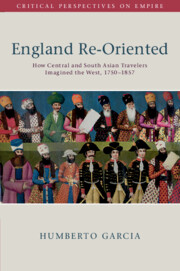Book contents
- England Re-Oriented
- Critical Perspectives on Empire
- England Re-Oriented
- Copyright page
- Dedication
- Epigraph
- Contents
- Figures
- Acknowledgments
- Note on Transliteration
- Introduction
- 1 The British Raj’s Mimic Men
- 2 A Bluestocking Romance
- 3 The Theater of Imperial Sovereignty
- 4 Loving Strangers in Ireland
- 5 Heavenly Bodies in Motion
- 6 Dreaming with Fairyland
- 7 The Making of a Mohamedan Gentleman
- Epilogue
- Book part
- Select Bibliography
- Index
1 - The British Raj’s Mimic Men
Historicizing Genteel Masculinities across Empires
Published online by Cambridge University Press: 06 November 2020
- England Re-Oriented
- Critical Perspectives on Empire
- England Re-Oriented
- Copyright page
- Dedication
- Epigraph
- Contents
- Figures
- Acknowledgments
- Note on Transliteration
- Introduction
- 1 The British Raj’s Mimic Men
- 2 A Bluestocking Romance
- 3 The Theater of Imperial Sovereignty
- 4 Loving Strangers in Ireland
- 5 Heavenly Bodies in Motion
- 6 Dreaming with Fairyland
- 7 The Making of a Mohamedan Gentleman
- Epilogue
- Book part
- Select Bibliography
- Index
Summary
The first chapter examines the British East India Company’s transformation into Bengal’s territorial sovereign in 1764 as an embodied history. The British men who worked for this trading monopoly adopted Persian titles that recall the polite historical protocols of Perso-Turkic-Mongol empires since the fifteenth century. These titles personified a corporate English body as an individual nobleman who was the imperial family’s only and most powerful patriarch – the ultimate mimic men. A shared ethical and linguistic orientation inspired Asian travelers and their British hosts to imagine an ethnic kinship, as mediated by the Indo-Persian political treatises that Company lexicographers had translated into conduct books for genteel Englishmen aspiring to a career in India. This trans-imperial masculinity was what empowered Asian travelers to climb social rank and challenge the Company’s claim to Mughal sovereignty as they befriended metropolitans in public showplaces – theaters, salons, and drawing rooms. The chapter proposes that orientalism and occidentalism are inadequate paradigms for understanding these travelers’ multimedia engagements in Britain.
Keywords
Information
- Type
- Chapter
- Information
- England Re-OrientedHow Central and South Asian Travelers Imagined the West, 1750–1857, pp. 14 - 37Publisher: Cambridge University PressPrint publication year: 2020
